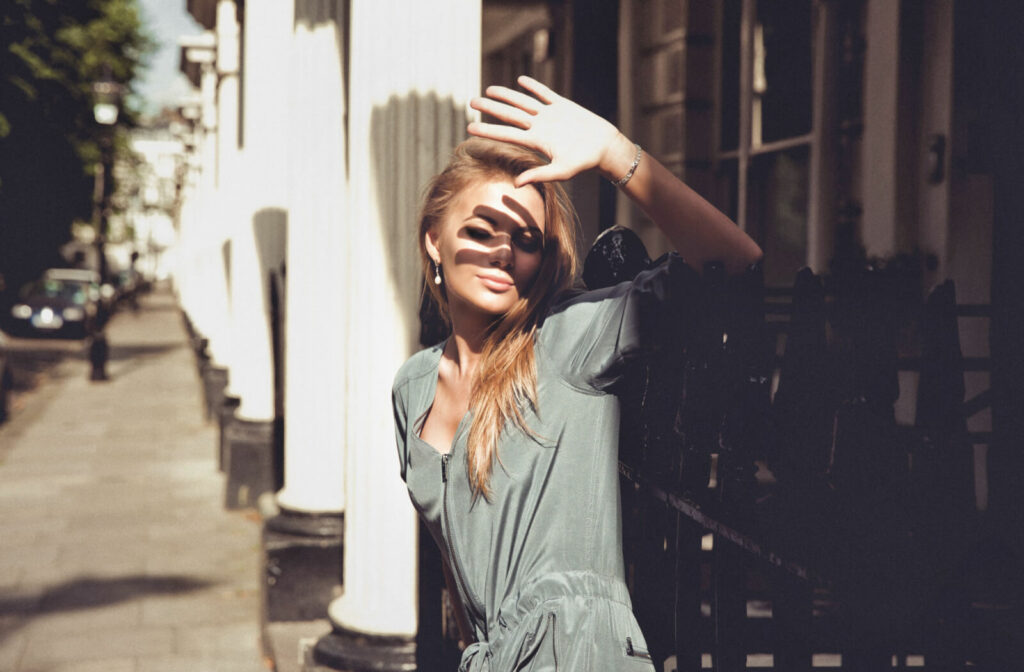At one point, light sensitivity because of eye color may have begun as an old wive’s tale. However, we now know that light-colored eyes such as blue, gray, or green can all contribute to a light sensitivity condition called photophobia. Fortunately, this condition won’t result in any permanent damage. However, being sensitive to light can aggravate other conditions such as dry eye.
If you have blue eyes, you’ve probably already experienced some of the symptoms of being extra sensitive to light. In some cases, this could be a warning sign which warrants an eye examination. But if you have light-colored eyes and have always been sensitive to the sun, there’s a good chance that’s your issue.
Why are Some Eye Colors More Sensitive?
We know that eye color can contribute to photophobia, but it’s not immediately clear why. To understand, let’s take a closer look at how the eye processes light.
One of the primary reasons that eye color can increase your risk of photophobia is because of the pigment, melanin, or lack of it. Melanin acts as a protector of your retina. It reflects light out of the eye by scattering it in a process called Rayleigh scattering. In an individual with light-colored eyes, there is far less melanin, which decreases the amount it can protect the retina.
When too much light is allowed to pass through the retina, this can lead to sensitivity because the nerve bundles at the back of the eye become overstimulated.
Are Blue Eyes More Sensitive to Light? Photophobia Is the Likely Reason
In most cases, photophobia is a recurring condition with little lasting effect other than the discomfort at the time. However, suppose you’re suddenly experiencing this condition. In that case, it’s a good idea to see the eye doctor as it can be caused by an underlying condition such as cataracts or other eye injuries.
Symptoms of photophobia include:
- Sensitivity and aversion to lights
- Feeling like regular lights are much brighter than they are
- Discomfort when exposed to light
- Squinting
- Excessive tear production
- Bright colored spots in your vision–even when it’s not light out
- Wanting to shut your eyes in the light.
Treating Photophobia
There is no single treatment for photophobia because it’s primarily a symptom of an underlying condition. So, the treatment is typically based on what the cause is.
Here are several common treatment options:
- Staying out of the sun or wearing heavily tinted sunglasses are one of the first lines of treatment for light sensitivity, especially if it’s due to light-colored eyes.
- Eye drops—the type of eye drops will depend on your eye doctor’s diagnosis with an exam. They may be anti-inflammatory, anti-bacterial, or even simply lubricating if you are experiencing dry eye syndrome with photophobia.
- Prescription medication—again, the type of medication is based on the root of your sensitivity issues.
- Sometimes the recommended treatment is to simply rest your eyes. If migraines are causing your photophobia, then rest will likely be one of your doctor’s top recommendations.
Importance of Protecting Your Eyes From the Sun
Regardless of your eye color, protecting your eyes from the sun is important. However, suppose you do have light eyes. In that case, it’s that much more so because your eyes lack some natural protection that darker eyes provide that make you more sensitive to light.
What Can Happen Without Protection From the Sun?
The primary reason you should wear sunglasses is to protect your eyes from harmful UV radiation. These rays can affect almost every part of your eye, from the retina to the cornea to your eyelids.
Macular degeneration, cataracts, and corneal damage are three diseases and conditions that can develop in your eyes due to UV radiation. In addition, you also run the risk of getting skin cancer on your sensitive eyelid skin.
How to Protect Your Eyes
The best way to protect your eyes from UV radiation is by wearing sunglasses that provide UV400 or 100% UV protection. If you’re unsure which ones provide this, your optician or optometrist can help you pick the right ones.
In addition to the sunglasses, there are also special contact lens options that provide some protection against the sun.
When discussing protecting your eyes outside, a common question is whether you need to wear sunglasses even if it’s cloudy. The answer to this is that you should. Even when it’s overcast, up to 30% of harmful UV rays still penetrate Earth’s atmosphere.
Find the Perfect Pair of Sunglasses
Don’t suffer from photophobia when you’re spending time outside. Make sure you have a pair of sunglasses with a suitable tint and coatings for your activities. And also, ensure that they have 100% UV protection to reduce your risk of sun-caused diseases or conditions.
Stop by one of our offices today. The knowledgeable staff at Optical Illusions are happy to help you find the perfect UV protection sunglasses—prescription or otherwise—for your particular vision or sensitive to light needs.



